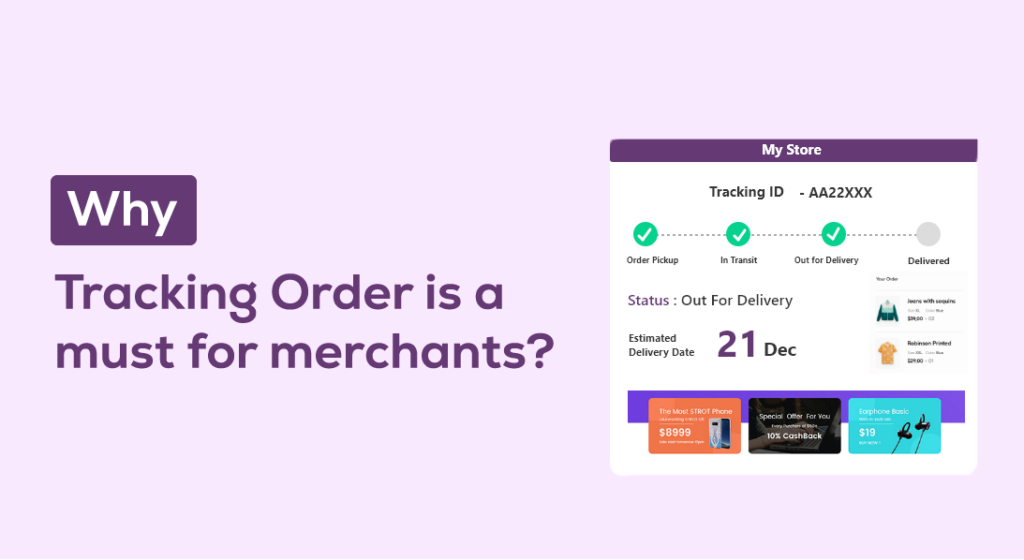
What is order tracking in eCommerce?
Order tracking has become a basic expectation in today’s e-commerce environment. Order tracking is an increasingly common e-commerce feature which monitors shipments and communicates necessary order updates with consumers.
Studies show that 97% of shoppers expecting the ability to monitor the shipping of their orders and find all their package tracking information on the retail site.
Why is order tracking a must for merchants?
Autonomy
A fundamental benefit of using order tracking services is that merchants take direct control of the shipping experience their customers have, instead of leaving it to external services.
By adding a branded tracking page to your e-commerce store, you retain customer presence instead of redirecting it to the shipping carrier’s website. Purchasers are eager to receive their package, checking their order status an average of [7 times]. They are also [50-80%] likely to open a tracking notification compared to the 10-20% likelihood of a normal promotion notification.
Keeping up post-purchase customer interactions can seriously drive positive consumer engagement. This engagement is lost when they’re redirected to a carrier website to check their shipping data. Using tracking services, merchants control their inventory, order fulfilment, and data tracking for delivery analytics.
Cost and time efficiency
Customer questions are costly in the long run. In small scale businesses, you can exhaust your time responding to consumer problems. And if there are enough inquiries, you will need to hire someone for customer service or outsource to a bot to respond to all the incoming messages.
If the buyer messages first after purchase, you’ve already missed an opportunity. To improve post-purchase experience, proactive messaging (letting the customer know when an order is being processed, has gone out for delivery, etc.) reduces the number of customer service queries and increases the customer’s trust in your business. Before they can even ask, you tell them what they want to know.
Automating this process reduces the amount of time and money your business needs to invest in customer relations. It also reduces expensive delivery mistakes. Order tracking streamlines the shipping process for merchants who sell on multiple sales channels (physical storefronts, social media, and digital marketplaces). It also provides consistent customer experience for merchants who use multiple shipping carriers.
Return orders or lost deliveries disrupt workflow, obstruct supply chains, and impact your business’ bottom line. By keeping all orders’ tracking information and data consolidated, regardless of shipping carrier or sale channel, it’s easier to keep tabs on all the moving parts of post-purchase experience.
By ensuring a standardized and high-quality post-purchase experience for your consumers, you alleviate extra work for you and your customer support team. Then, you’re free to invest more resources into other realms of customer experience.
Customer trust and retention
Since 2019, the cost of acquiring new customers has surpassed the lifetime value of the customer. That goes to say, it’s better for your business to invest in customer retention than just CAC (customer acquisition cost). And nothing has quite the same impact on consumer retention like post-purchase interactions.
After a poor delivery service, 83% of shoppers say they won’t return to that e-commerce store. Because of the Amazon Effect, customers expect high quality shipment tracking. From widget displays of delivery status to omnichannel messaging (SMS, email, and so on), they want to be in control and in the loop of their shipping information.
If they know how to use it, this expectation is an advantage to merchants. By taking control of their post-purchase interfaces, merchants can gain even more traction with their consumer base. As mentioned before, it’s while a customer is waiting on the delivery of their package that they’re most willing to open messages and emails. And, if you’re using a tracking service on your website, customers are more likely to be redirected to further shopping.
To increase repeat revenue and gain customer loyalty, consumers need to trust their merchant. Using an order tracking service, merchants can anticipate consumers’ needs, proactively answer questions, resolve issues swiftly, and change their shipping methods based off analytics of their customer base.

How does Trackship help?
Trackship is a Shipment Tracking API that provides a branded post-purchase customer experience. In collaboration with over 950+ different shipping providers and carriers, we auto-track shipments and streamline post-shipping workflow. With customizable touchpoints for every step of post-purchase interactions, we help you curate customer engagement and keep your buyers happy and connected to your e-commerce store.
